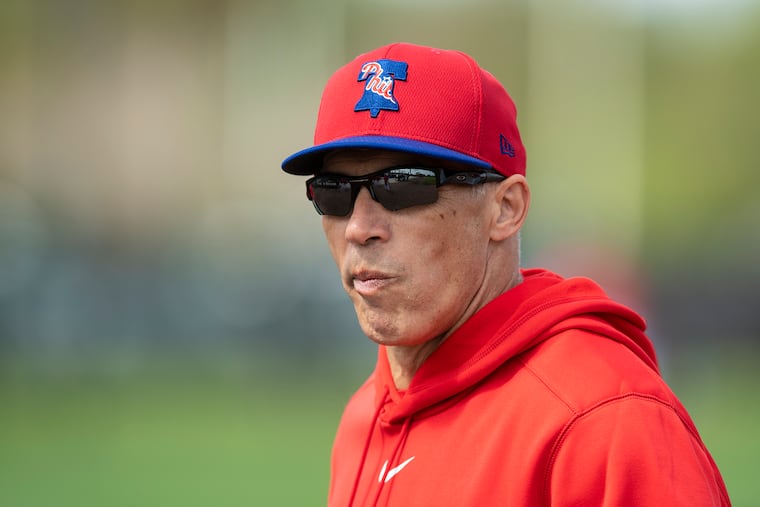Phillies manager Joe Girardi was vocal union member during 1994-95 labor dispute | Bob Brookover
Girardi was the player representative for the Chicago Cubs and Colorado Rockies during his playing career, so he knows how intense these labor disputes can be.

Joe Girardi knows what it’s like to be right smack in the middle of a nasty labor war. A quarter century ago, as baseball endured a 232-day strike that led to the cancellation of the 1994 World Series and a controversial six-week spring training with replacement players, the Phillies manager was one of the louder voices on the players union side.
When baseball’s eighth work stoppage in 22 years shut down the game on Aug. 11, 1994, Girardi was in the first season of a three-year contract worth $5 million and he was the player representative for the Colorado Rockies. By the following February, tensions between the players and owners had escalated to an all-time high.
Girardi, 30 years old at the time and the clubhouse leader of the expansion Rockies, got a call at home. A reporter informed him that the Rockies planned to offer $150 per exhibition game in an effort to entice their minor-league players to participate in the replacement Cactus League games.
The fuse was lit. Girardi, in the midst of a tirade that infuriated his employer, called the $150 offer “a bribe.”
"It kind of makes me sick to my stomach,” Girardi said. “I thought we had a model organization. Now, I have to question that. It’s kind of a gutless move, if you ask me. They’re just using these poor kids and then they’ll throw them away like disposable diapers.”
Girardi also squashed the idea of replacement ball.
“After two or three days of watching UPS drivers trying to play baseball, then what are you going to do?” Girardi said at the time. “The product is bound to be horrible. It’s a slap in the face to say: ‘You will pay for any brand of baseball we put out there.’ That’s telling the fans, ‘You don’t know the game.’ I mean you’re talking about players who were released or who are retired or who were never anything, for the most part.
“Yet in the next two weeks the teams will try to put pressure on the big-leaguers by showing shots of 100 players in spring training, but only a few of them are replacements. The rest are low-level minor-leaguers, but the teams will act as if they have tons of people lining up to take our jobs.”
Rockies general manager Bob Gebhard offered a biting response to the catcher who had emerged as a fan favorite during the franchise’s first two seasons of existence.
“We do consider this a model organization,” Gebhard said. “And we should not have to take any abuse from any member of our own club whose opinions are a bit jaded due to his association with the union. I guess all you can do is say, ‘consider the source’ when comments like those of Joe Girardi are made.
“It’s unfortunate that when you reach a point of security in your profession you forget about how you got there. I’m quite sure that at some point in Joe’s past his participation in exhibition games as a non-roster player expedited his path to the majors.”
Girardi apologized for his remarks the next day, saying “I’m a man and I’m not afraid to admit I made a mistake. I made comments out of frustration and anger and that’s a mistake in itself.”
When the players finally returned in early April, Girardi confessed to being concerned about how the fans in newly built Coors Field would receive him.
“I never had a problem with fans before,” he said. “I knew it was the wrong thing to say as soon as I hung up. I thought about calling the reporter back, but I didn’t and I’m not sure why I didn’t. My emotions were on such a roller coaster with the strike and everything else that was going on.”
There should have been no need for Girardi to apologize. What the owners attempted with replacement players remains the most nonsensical exercise in baseball history. For the record, Girardi was booed in his first plate appearance at Coors Field on opening day, but he provided the perfect response by getting four hits in a 14-inning Colorado victory over the New York Mets. They were back on his side the rest of the season.
Not playing a season over a financial dispute between the owners and players in the midst of a global pandemic is a bad idea that could give replacement ball a run for its money. It has at least entered the conversation.
Girardi has not publicly weighed in on anything baseball related for quite some time and even if his thoughts vaguely resemble what he felt about replacement players a quarter century ago, his words as a manager would surely be far more measured.
It is possible, however, that his past as a player representative might help him in his future as Phillies manager. There was speculation during his playing career that the Rockies and Chicago Cubs traded Girardi because of his player-rep status. Gebhard denied that was the case when he traded Girardi to the New York Yankees after the Rockies became the first National League wildcard team in 1995.
The deal worked out a lot better for Girardi than the Rockies anyway and he has a collection of World Series rings to prove it.
Now, with baseball in its first contentious labor negotiations in 25 years, it is beneficial that Girardi knows how many of his players are feeling in these tense times. He not only lived through the labor tension, he was on the front line. If current union rep Rhys Hoskins wants to discuss his own feelings about what’s happening right now, Girardi could offer some sage advice.